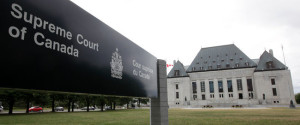Supreme Court to hear Grassy Narrows appeal on logging dispute
It’s official. The Supreme Court of Canada will decide once and for all whether Treaty 3 can prevent the provincial government from issuing logging licenses inside Grassy Narrows First Nation’s traditional territory. The decision could have wide-ranging implications for the treaty rights of First Nations across the country.
The case has been climbing through the court system for 15 years, ever since a group of Grassy Narrows trappers launched a lawsuit to prevent the provincial government from allowing clear-cutting north of the English River. For the past 10 years, the First Nation has maintained a blockade preventing access to woodlots north of their community.
“I was on my boat when I got the call that we were going to the Supreme Court, and I was really excited” said Joe Fobister, one of the trappers who launched the original lawsuit.
“What really drove us to launch the lawsuit was the province ignoring our demands to prevent clear-cutting,” he said. “That’s the biggest thing for me, and it think it is for the community too. The government has basically ignored our rights on our own land.”
The Supreme Court appeal addresses the question of whether the language of Treaty 3 prevents the provincial government from issuing logging licenses for woodlots inside Grassy Narrow’s territory. Grassy’s lawyers have argued in lower courts that a clause in the treaty gives the First Nation the right to continue hunting, trapping and fishing in the land they surrendered to the Crown, which includes the area of the Whisky Jack Forest the province was going to allow Abitibi-Consolidated Inc. (now Resolute Forestry Products) to conduct clear-cuts in 1997.
The government’s lawyers argued that the treaty exempts any lands that are “taken up” by the Crown for uses such as “settlement, mining, lumbering or other purposes by “Her said Government of the Dominion of Canada, or by any of the subjects thereof duly authorized therefore by the said Government.”
A previous court decision sided with Grassy Narrows, saying the only way Ontario government could “take up” land was after agreement from the Federal Government, and by extension Grassy Narrows.
The most recent court decision handed down by the Ontario Court of Appeal, rejected this line of reasoning, saying that provinces have sole authority to manage their natural resources. So Ontario did not need the federal government’s agreement to exercise its ability to take up land for development.
“A requirement that Canada interpose itself and approve the ‘taking up’ of lands is fundamentally at odds with this established constitutional framework and cannot be sustained,” ruled the judge in March.
Grassy appealed this decision to the Supreme Court a few weeks after, and the high court announced Thursday it will hear the case. After seeing rulings on their case change so often during the appeals, Fobister is circumspect about their chances at the Supreme Court.
“I can’t say I’m optimistic, but I’m hoping we do get a positive result … I’ve had some mixed feeling over the last 15 years as I watched (the lawsuit move from court to court). Some days I feel really excited, other days I think we’re going to lose.”
While the legal processes are ongoing, the province has prepared for logging in the area of the Whiskey Jack Forest in question. A map of woodlots north of the English River from the Whiskey Jack forestry plan shows designated logging blocks in the area Grassy Narrows claims to be their traditional territory.
There are plenty of logging blocks scheduled to harvested in 2014, but those to the immediate north and west of the community, which are accessible only by the blockaded roads, are not scheduled until the Phase 2 allocation begins in 2017.
“We have purposely left harvesting in that area until Phase 2 to give ourselves enough time to do more negotiations with Grassy Narrows and work on that relationship so we can move forward. Until the licensing step, that land is considered available, but nothing will happen until we license it … and we can’t do that until there’s a court decision,” said the forestry plan’s author, Ministry of Natural Resources forester Kurt Pochailo.
No court date for Grassy’s appeal has been set at the Supreme Court so far, but it is typical for several months to pass before a hearing begins, and months more before the Justices render their decision.
No matter which way they decided, the court will be setting an important precedent for First Nations treaty rights over resource development, which will affect communities and governments across the country.
“ A decision in our favour is really going to help a lot of First Nations,” said Fobister





